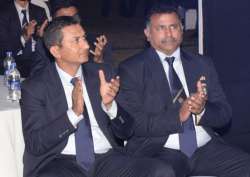India need one good left-arm pacer, says bowling coach Bharat Arun
India's bowling coach Bharat Arun said that inclusion of a left-arm fast bowler will be beneficial for the team.

Variation in any bowling attack makes it lethal and that's precisely the reason why bowling coach Bharath Arun is in search of a potent left-arm speedster, who enables Indian team to have all bases covered. Since Zaheer Khan's departure, India have not found another capable left-arm pacer. The skillful Ashish Nehra despite his injuries have done commendably in shortest format for some time while Jaydev Unadkat lacked pace.
Barinder Sran was a skiddy bowler, who faded away rather quickly and Aniket Chaudhary is still not a finished product.
In his second stint, Arun expects better communication with A team chief coach Rahul Dravid and bowling coach Paras Mhambrey.
"I have just come into this role so definitely we will be speaking to the coaches of the 'A' team and I guess there needs to be information that needs to be shared for us to make best use of bowlers coming in. We have wrist spinners like Kuldeep Yadav and Yuzvendra Chahal. So, if we can get even one good left-arm fast bowler it will go well for the side," Arun told reporters on Tuesday.
Arun insisted that Ravichandran Ashwin despite playing only 15 ODI matches since 2015 World Cup, is very much in the scheme of things.
Asked if he is in scheme of things for the 2019 World Cup, Arun said: "This question should be asked to the selectors but as bowling coach I think he is an extremely talented bowler. Even if you look at his last ODI which he played in West Indies, he has got 3 for 28."
"He (Ashwin) is very skilful. I don't want to look at what has happened so far but he is definitely part of the ODI team. We would also like to give a lot of opportunities to other bowlers as well (hence the rotation), then we can have a long-term plan in place and then we will take a call accordingly," said Arun.
He wasn't around for a year bit Arun believes that the bowling unit has improved tremendously in the last two years.
"If you look at the bowling unit as a whole there has been tremendous improvement since the last couple of years. But looking ahead to the 2019 World Cup, we will need to have back up options for every bowler that we have. There are enough bowlers in our country to provide that bench strength," he added.
Arun spoke effusively about Hardik Pandya, who is quickly developing into a reliable pace option for India.
"If you look at Hardik, he works up very good speeds and bowls 135-plus consistently. He wants to bowl those full 10 overs. And he does understand that to bowl those 10 overs he needs to work harder and become more skilful. He is not afraid of trying different things. So my job is a lot easier to be working with somebody like Hardik who wants to upgrade on his skill," the former Tamil Nadu medium pacer said.
Arun explains that any bowler, who works on the feedback provided by him needs to perfect that in practice before using it in the match.
"It depends on what the bowler is capable of doing. Not only their actions but also what is easier for them to do. So it is my job to understand that and give them the right feedback. Each bowler takes a little while to be able to do that in a match, you need to put in some hours of practice and you need to perfect that in practice before you are able to put that skill in the match," he added.
Monitoring the workload of bowlers is also another aspect that bowling coach and the team management has to look into.
"Fast bowling is about 50 percent fitness and 50 percent on your skill. So to remain fit, to bowl fast over a period of time, you have to be extremely fit and that's one thing that we are emphasizing on," he said.
"It is important that we monitor the workload of the bowlers. You take into account not only what they do in practice but also what they do in the matches and you keep their workloads pretty ideal. That's the key to workload management," he signed off.
(With PTI inputs)